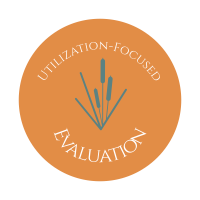Our Approach
Utilization-Focused Evaluation is based on the premise that evaluations should be judged by their utility and actual use; therefore, evaluators should facilitate the evaluation process and design any evaluation with careful consideration of how everything that is done, from beginning to end, will affect use. The focus in utilization-focused evaluation is on supporting intended use by intended users. The essence of this approach is a continual examination of and adaptation to how real people in the real world apply evaluation findings and how they experience the evaluation process. Click here to access more resources about Utilization-Focused Evaluation from the new 5th edition.
Developmental Evaluation supports innovation development to guide adaptation to emergent and dynamic realities in complex environments. Innovations can take the form of new projects, programs, products, organizational changes, policy reforms, and system interventions. A complex system is characterized by a large number of interacting and interdependent elements in which there is no central control. Patterns of change emerge from rapid, real time interactions that generate learning, evolution, and development – if one is paying attention and knows how to observe and capture the important and emergent patterns. Complex environments for social interventions and innovations are those in which what to do to solve problems is uncertain and key stakeholders are in conflict about how to proceed. Click here to visit the Developmental Evaluation resource hub, hosted by the McConnell Foundation.
Principles-Focused Evaluation informs choices about which principles are appropriate for what purposes in which contexts, helping to navigate the treacherous terrain of conflicting guidance and competing advice. What principles work for what situations with what results is an evaluation question. Thus, from an evaluation perspective, principles are hypotheses not truths. They may or may not work. They may or may not be followed. They may or may not lead to desired outcomes. Whether they work, whether they are followed, and whether they yield desired outcomes are subject to evaluation. Learning to evaluate principles, and applying what you learn from doing so, takes on increasing importance in an ever more complex world where our effectiveness depends on adapting to context. Read more.
Blue Marble Evaluation focuses on integrating design and evaluation of programs and initiatives engaged in making global systems sustainable. Design, implementation, and evaluation are typically treated as separate functions dealt with sequentially by different people with different roles who don’t communicate with each other. At the heart of the Blue Marble perspective you’ll find a pattern of breaking down silos, integrating separated functions, connecting people and places, and creating linkages across time. Visit the Blue Marble Evaluation website to learn more.

